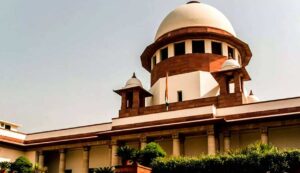Supreme Court’s opinion sought on time limit for President’s reference to state bills
New Delhi: There has been a tremendous deal of legal discussion around the Presidential referral under Article 143, which sought the Supreme Court’s decision on the deadlines for providing assent to State Bills. The problem arose from the Supreme Court’s April 8 ruling, which sought to set deadlines for the presidential and gubernatorial approval of legislation submitted by state legislatures.

Some legal experts claim that because Articles 200 and 201 of the Constitution do not specify precise boundaries, they allow for discretionary interpretation, while others maintain that such timetables improve efficiency and avoid unnecessary delays.
Critics also wonder whether the Supreme Court may set legally obligatory deadlines on constitutional authority using its exceptional powers under Article 142.
The referral touched on the lines between the executive and judicial branches and was characterized by former Law Minister Ashwani Kumar as an important constitutional and political development. He remarked on the increasing discussion after the Supreme Court’s ruling and said he hoped a constitutional bench would provide an advisory opinion to shed light on the matter. In order to avoid an apparent dispute between the court and the administration, which might be harmful to governance, Kumar emphasized the need to find a solution.
Siddharth Luthra, a senior advocate and former Additional Solicitor General (ASG), said that the reference’s goal is to ascertain how much authority the Supreme Court has to guide the President and Governors in their decision-making. He brought up important issues about federalism and governance, such as whether constitutional authority might permanently refuse assent, which would hinder government and deny individuals their right to vote.
According to constitutional law expert Sumit Gehlot of Fidelegal Advocates and Solicitors, the President may consult the Supreme Court on factual or legal matters of public concern under Article 143. Citing the lack of a deadline under Articles 200 and 201, the Supreme Court heard the Tamil Nadu Government’s appeal in State of Tamil Nadu vs. Governor of Tamil Nadu & Anr. about the Governor’s tardiness in approving state assembly legislation. The Court used Article 142 to order the President and Governors to take immediate action in order to preserve justice and close legal loopholes.
Gehlot emphasized that the ramifications of the Court’s order and whether or not Presidential action was necessary are the main issues, not whether the President may ask the Supreme Court for its view. He said that Article 74 restricts the President’s ability to make autonomous decisions by requiring him to follow the Council of Ministers’ recommendations. The Supreme Court has already issued orders, such as mandating prompt rulings on requests for compassion.
Advocate Gehlot further emphasized that the Central Government’s suggestions, the Sarkaria and Punchhi Commissions’ recommendations, and the Ministry of Home Affairs’ Office Memorandum dated February 4, 2016, served as the foundation for the Court’s April 8 direction that established a three-month deadline. The three-month deadline for completing state government laws must be scrupulously adhered to, according to the memorandum. He said that continuous delays in bill approval are unacceptable and that the President is still answerable.
Prominent lawyer and advocate Ashish Dixit said the President may consult the Supreme Court on important factual and legal issues. Before rendering an opinion, the Court may convene hearings if necessary; however, this is not constitutionally required of the President nor binding as precedent. The Court decided in a 2002 reference that it may either politely reject or react.
The governor and the president are now subject to limited judicial scrutiny in their official capacities, according to recent jurisprudence. The President cannot participate in legal proceedings, according to a previous ruling by the Supreme Court. The President’s current reference focuses on constitutional questions raised by the Court’s decision in the governor of Tamil Nadu’s case.
Former Supreme Court Bar Association (SCBA) President Senior Advocate Adish Aggarwala praised the Presidential referral under Article 143, which requests an advisory opinion about the Supreme Court’s decision from April 8. Although Articles 200 and 201 do not set deadlines, he pointed out that consent is often anticipated in a fair amount of time depending on the situation. Citing a 1996 Supreme Court decision that said the implementation of Article 142 should remain flexible and ambiguous, Aggarwala warned against exploiting the provision to impose legally enforceable timelines on constitutional agencies.